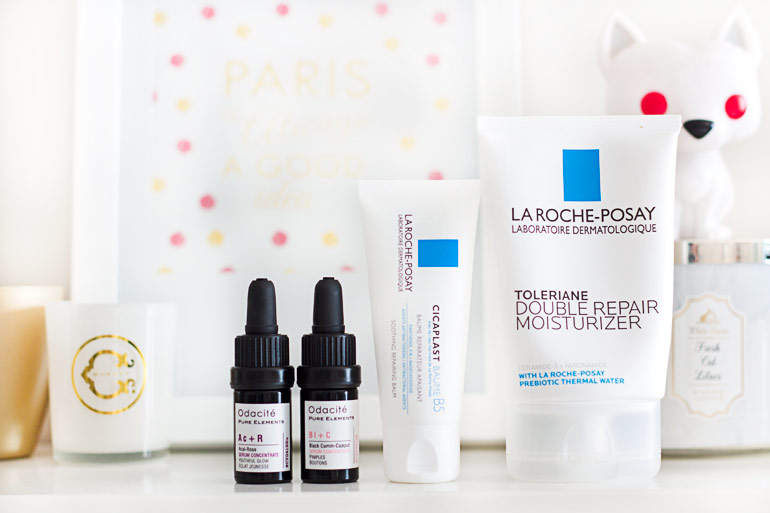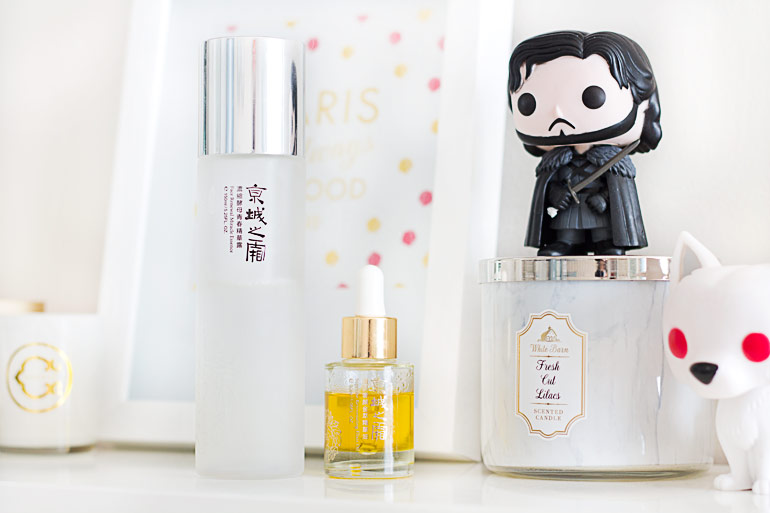If there’s one thing I learned over the years it’s that there are few absolute truths when it comes to skincare: your mileage may vary (YMMV), always wear sunscreen in the morning, and always double cleanse at night (because you wore sunscreen). Yet when it comes to skincare ingredients, an area that’s very much YMMV and where most of us have a moderate understanding at best, we’re sometimes too quick to jump to conclusions. I know I was definitely guilty of this in the past, getting all excited whenever I saw mile-long ingredient lists.

After all, aren’t 10 extracts better than 1, and how can having vitamins A, B, C, D, E, F, and G in in a single product be a bad thing? Inherently there is nothing wrong with having a long ingredient list with plenty (or should I say plant-y? harhar) of extracts and vitamins and ceramides and unicorn tears, and there are definitely cases where more can be better. The fallacy is thinking that long ingredient list = a better product.
From my personal experiences, I’ve actually found that shorter ingredient lists typically produce better results for one or more of the following reasons:
- Less chances of an allergic reaction or irritation. You can never be too sure which ingredient will irritate your skin, and the more there are, the higher your chances. This is why you’ll typically see smaller lists on products for sensitive skin.
- Less chances of product conflicts. Again, it’s a game of probability. The more ingredients in a product, the harder it is to figure out the culprit that’s causing the pilling and balling.
- You’re probably getting more of each ingredient. Let’s say you have 2 products, both with licorice root extract. One contains just 7 ingredients total, and the other 60. Which one do you think will have a higher % of licorice root extract?
- Potentially less markup. This isn’t result-related, but having more ingredients can give brands the leverage to charge more for the product. After all, it’s easier to justify the higher price to consumers when a product contains 20 different extracts instead of just 2. #justsayin

Odacite and La Roche-Posay are just 2 of my favorite brands that carry great products with simple ingredients
Through much trial and error I’ve learned that more ingredients don’t always mean the product will be more effective. Take Odacite serums for example, you can count the number of ingredients with one hand, yet they’ve improved my skin more than many complex serums ever have. Cosrx is another brand I raved about, and they too specialize in great affordable products with simple ingredients. A recent discovery + favorite of mine has been La Roche-Posay (yes I know they’ve been around forever, I’m just slow like that), and I can always trust them to soothe my skin when it’s irritated.
This isn’t to say less ingredients = better product either, but rather that you shouldn’t use the length of a product’s ingredient list to determine its quality. While my experiences with lengthy ingredient lists have been less successful, two of my favorite skincare products actually include 70+ different ingredients: the Naruko Face Renewal Miracle Essence and Naruko Supreme Rejuvenating Elixir Oil

So what is a girl (or boy) to do?
First, if you’ve been programmed to think more is better when it comes to skincare ingredients, time to reprogram your mind. A product is good because it’s well-formulated, whether that’s with 5 or 50 ingredients. However, I do think the following folks might find simpler ingredients (assuming they’re well-formulated!) more agreeable with their skin:
- those with sensitive skin
- those with irritated skin (can be a temporary condition from over-exfoliating or sunburn)
- those with acne-prone skin
- those with a compromised moisture barrier (may manifest itself as red, dry, or tight skin)
In the end it’s all about finding what works best for our skin, and if you’re still searching, it never hurts to keep an open mind in the process.
Thank you for reading, and do share your thoughts on the topic in the comments below. Have a great rest of the week + weekend!


This seriously got me thinking as well! This is why I’ve stayed away from expensive multi-ingredient brands and have really tailored my skincare products to specific skin concerns I want to target specifically! I’m seeing better results this way too!
This is a really great post and something to really think about. Anything with a shorter ingredient list is just always going to be better in my opinion. A lot of products make promises but they do not deliver. xx
Ann-Marie | http://facetocurls.com
I really agree with this, i used to be that girl with a bathroom & dresser full of products but i’ve learnt that less is more and my skin thrives when i stick to a few basics.
http://anaturellecraving.blogspot.sg/
I have to say, I am thoroughly enjoying the bobble heads you have been slipping into the photographs. I am definitely a huge believer in short ingredient lists– both for food, and what goes on my skin. It’s why I/m actually using a cleanser from trader joes right now, with honestly, amazing results. because everything is super natural, and there really aren’t that many ingredients. And I definitely have seen improvement on my skin. Wow though, 70+ ingredients? What does Naruko put in there?
http://cynicalduchess.com
I’ve found that too, the less ingredients and the more natural ones are always better!
Raindrops of Sapphire
I totally agree! We can also fall into the fallacy that something with a simple ingredient list is automatically “cleaner” or “more natural,” at least I’ve seen some products marketed that way. I recently saw a cream by a green beauty brand that bragged about its simple ingredient list and then when I looked at it, it was basically all mineral oil.At the end it really depends on the specific product and the ingredients.
I think the problem arises with long ingredient lists when a product promises to do too many different things. Then it’s got a bunch of different ingredients competing to do 32094824 things and doesn’t exceed in any of them.
Thanks for the interesting read :)
More is definitely not always better. What you wrote all makes sense. If there are more ingredients, it does up the chance of negative reactions. But it also depends on the products/ingredients for me. Sometimes something with a short list doesn’t react well with my skin, but then a long one can also affect me. Good food for the thoughts post, Jenny :)
Thank you for reading Tara! And I agree, it’s still important to evaluate the actual ingredients rather than just looking at the quantity.
Hi ????
I’ve nominated and tagged you for the mystery blogger award. https://eirinisdiary.com/2017/05/07/mystery-blogger-award/ ????????
Thank you for the nomination!
Great post and very detailed!
Lisa Linh
https://www.bylisalinh.com/blog/2017/6/5/with-hair-food
Thank you Lisa!
This is a good topic! I have to agree, and the main reason why I personally think less ingredients work better, is because you get more of each product. If you have a vitamin C and E product, and then a A,C,D,E product, you’re then splitting those ingredients evenly in to four, vs two. And of course all the other ingredients that come in the product. I think higher concentrations work better, at least for me. At the end of the day though, it just depends on what’s in it. It can have a really long list and be a great product that I love. :)
-Emily http://www.coatandcoffee.com
Thank you Emily! My skin is very similar to yours in that higher concentrations of a few ingredients tend to work better for me as well :) In the end it’s just about finding out what works for us!
Fabulous post lovely. I love La Roche Posay products.
Ash | http://www.mstantrum.com
Thanks for reading Ash!
This was a fun post! Love the products you mentioned :)
http://www.bauchlefashion.com/2017/05/met-gala-2017-greatest-hits.html
Thanks you for reading Heather! :)
You make a great point! I think the shorter ingredients list is better and definitely makes me less worried to try it on my skin!
http://www.myclusterofthoughts.com/
Thanks for reading Katherine! I feel the same way about trying products with simpler ingredients.
Great post Jenny! I have super fussy, sensitive skin and long ingredient lists scare me! One of the brands I’ve been dying to try is Sum:37 but again the long ingredient list makes me a little skeptical. I do want to try Odacite, I know you rave about their products here on the blog and I always see them on Instagram. Thank you for sharing this post!
~ Cat L.
http://www.CatsDailyLiving.com
Thank you for reading Cat! One thing I’ve noticed is that Korean brands, unless they’re marketed as having simple ingredients, tend to have really long ingredient lists! I think that’s why they tend to be a hit or miss with my skin, probably because there’s an irritant in there but with so many other ingredients it’s hard to figure out which one is the culprit. Let me know if you ever try Odacite, I’d love to hear your thoughts!
I had never thought about this before, to me the more ingredients the wearier I am because there might be something not so great lurking in there and it will take more time to research the product. Great post! Xx
ALittleKiran | Bloglovin
Thank you Kiran and that’s such a great point! I definitely find myself spending more time researching and analyzing the ingredients when the list is longer!
I prefer shorter ingredient lists in my products. Not exclusively, but as someone that religiously scans every ingredient on the list I find that the longer the list, the more “filler” ingredients like thickeners, preservatives, fragrance etc. I get. For me more products with less ingredients each is the way to go.
Linda, Libra, Loca: Beauty, Baby and Backpacking
That’s an excellent point, and now that you mention it I’m noticing it as well. That does make sense since with more ingredients I’m sure there’s more work involved to make everything blend well together, and I’m sure that probably involves adding extra ingredients to get the job done.
This is a great post, Jenny and I personally feel that the shorter ingredient list is better as you said, it’s higher concentration of the ‘good’ stuff. I am not too fuss with the length of ingredient list (yet!) but I am learning to read what’s good and what’s not and currently am in the midst of slowly cutting out SLS from my products. I have a suspicion that it’s starting to irritate my skin.
Thank you Shireen! It’s definitely easier to identify problematic ingredients when the list is shorter, and SLS is one of those for me as well – it dries out my skin and I have to work harder in my routine to rehydrate it :/
I love the Naruko essence and oil as well but in general I also try to steer clear of products with mile-long ingredient lists! It’s just hard to tell what’s causing irritation or sensitivity. Those odacite serums sound amazing, I should check them out!
Totally agree Camilla, and it’s one of the reasons why I stopped using Missha products – they didn’t work that well for me anyways, and some would break me out but I had no idea which ingredient was the culprit! Let me know if you ever do try Odacite, I’d love to hear your thoughts on them!